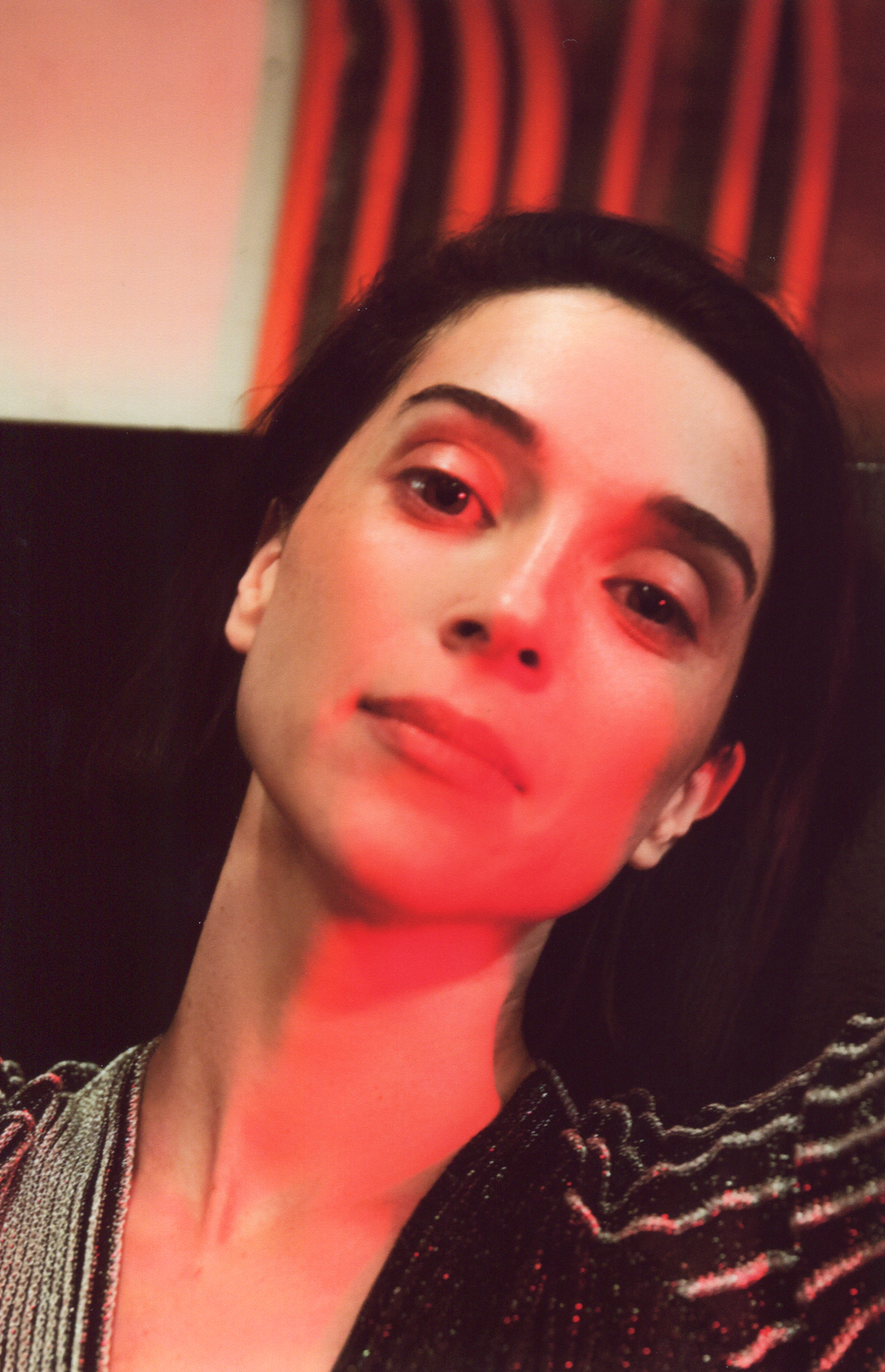St. Vincent and I are standing in a quiet, unused lobby of the Sydney Opera house when I ask her about the last time she performed here. “It was in the midst of a crippling depression,” she offers with a breezy laugh. I was expecting more of a “What a great audience!” answer.
In interviews, St. Vincent sets the pace: stepping between intellectualism, candour, and breezy impressions without breaking eye contact. When I spoke with her a few years ago, she politely unpicked my questions like stitches. A week after this meeting, she released an Instagram video series lampooning questions she always gets asked by well meaning journalists. None of this is to suggest she is mean spirited. She’s just smart, really smart, and expects you to stay in step.
St. Vincent is Annie Clark, the Texas native whose five albums — six counting Love this Giant with David Byrne — have minted her one of the decade’s most lauded musicians. She took the name of her doppleganger from There She Goes my Beautiful World by Nick Cave: “And Dylan Thomas died drunk in St. Vincent’s hospital.”
“At face value, a name like St. Vincent could sort of seem hifalutin, kind of referencing the divine or some high stature,” she mused. “For me it was really about the hilarity and humiliation that it takes to be an artist. You have to get comfortable with being bad at things so you can become good at them.” Conversations with Clark tend to weave back to the topic of identity. It’s unfortunate because she doesn’t really like talking about herself or chewing over words she’s already spat out — she saves that work for the albums.
When it was announced Masseduction would be co-produced with Jack Antonoff (the pop svengali who counts Taylor Swift, Lorde, Fifth Harmony, Sia, Troye Sivan and Carly Rae Jepsen as friends and collaborators) many wondered if Clark was building on the mainstream success of St. Vincent. Released in 2014 it was her highest charting album to date, and positioned her to creep towards a more traditional pop sound and audience. She didn’t take the bait. Masseduction is accessible, but in a distinctly St. Vincent way. “This record is about power…it’s about the seduction on a big scale, and on a little scale: political seduction, sexual seduction, seduction of chemicals and drugs, that’s kind of the broad strokes of the record,” she explains.
While writing it, she kept asking herself: “Who has power? Why? How do different people wield power? Who do I wield power over? How could I do it better? Who wields power over me? How can we be as liberated as possible, within the system?” They’re big questions, but ones she raises as simply as asking if she needs to take an umbrella.
While she’s always been weary of talk about women artists and “confessional songwriting,” she admits Masseduction is her most personal record. The press release promised, “if you want to know about my life, listen to this record.”
Her shifting musings on Masseduction have already lead to countless fan theories on its message —”it’s about love,” “it’s about sex and drugs,” It’s about and sadness,” “it’s about Cara” — which is just how she likes it. “I feel very much that once a record is done, it’s not for me any more, it’s for other people to interpret and put into their own lives as they see fit.”

With the record completed, she’s now focused on her next project, directing her first feature film. It will be a gender flipped, present-day remake of Dorian Grey. She was drawn to Dorian (and his creator Oscar Wilde) for their tangle of transgressions: “I felt like in some ways, there are themes in Dorian that I understand on a deep level, and have explored a whole lot through art in general. You’re talking sublimated queerness, alter-ego, narcissism… I know a thing or two about that.”
For her, the central character’s grotesque decadence and vanity can be read as a desire to find themselves— “the depravity, it’s wonderful.” It’s easy to draw lines between the novel, her albums, and the mounting public obsession with her appearance and relationships. She admits the “pitfalls of beauty worship” resonate.
The book’s central themes of vanity and ageing are topics we usually condemn women for, so taking out the male protagonist does feel sticky. How do you make sure this isn’t just another reductive look at female ego? “That’s what’s going to be the really tricky balance” she admits. “Male vanity, culturally, I think people find very gross. But female vanity is expected, because you’re meant to sculpt yourself for the male gaze. You’re not interested in seeing someone being punished for the sin of vanity… we’ll figure it out.”
Across her decade long career St. Vincent made an impression as an observant outsider, but now finds herself a reluctant media subject. “For me any success has kind of been slow and steady, like a lobster being slowly brought to a boil. I still have the same priorities and the same friends and my life hasn’t changed very much, so it’s hard to know if I’ve changed… Flashback here to me wiping my nose with hundred dollar bills,” she jokes at the end of conversation. “No I’m still Annie from the block… ew.”
credits
Photography Ribal Hosn
Styling Charlotte Agnew
